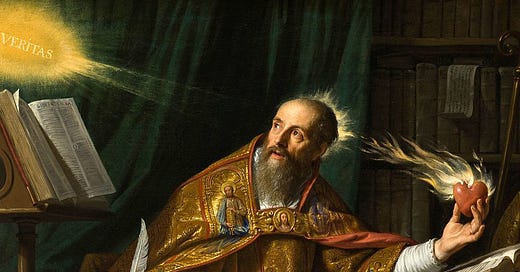One Christian author in history owns the distinction of having been read by popes, Protestants, rock stars, and leading atheists. He lived almost 1,600 years ago and was from North Africa. He is the single most prolific author of the ancient world and has influenced countless Protestants and Catholics. Named after two Roman emperors (Caesar Augustus and Marcus Aurelius), he is known to us as St. Augustine of Hippo (354–430).
After a youth filled with restlessness and rebellion and an early career characterized by the pursuit of pleasure and ambition, Augustine experienced a dramatic conversion to Christianity when he turned from his pagan and skeptical-based beliefs. His classic book Confessions details his dramatic conversion story and, to this day, remains a perennial bestseller that is read in great books programs as well as by famous individuals from diverse worldview perspectives.
Over his prestigious career Augustine wrote more than five million words. He was a robust theologian, an insightful philosopher, and a tenacious defender of the truth of historic Christianity. Widely considered the greatest of the church fathers, Augustine’s writings shaped aspects of Christian orthodoxy like creation, the Trinity, original sin, and salvation by grace. He is a universal Christian voice within Western Christendom and remains influential among scholars and laypeople alike.
Let me identify some of the diverse and well-known people who have read and been influenced by Augustine.
Favored Church Father of Catholic and Protestant Thinkers
In his medieval theological masterpiece known as Summa Theologiae, the great Catholic philosopher Thomas Aquinas (1225–1274) calls Augustine “The Theologian” and quotes his writings extensively. Thus, arguably the greatest Catholic thinker in history, Aquinas, was an appreciative student of Augustine.
In his blockbuster theological work Institutes of the Christian Religion, Protestant reformer John Calvin (1509–1564) also quotes Augustine extensively and makes a case for Protestants being in the Augustinian theological stream. So arguably Protestantism’s leading systematic theologian, Calvin, was an ardent pupil of Augustine.
The Augustinian Pope
Writing in personal, subjective terms about his life and thought attracts people to Augustine and causes them to reflect upon their own lives. The appeal of Augustine’s biography Confessions has extended all the way up to the head of the Catholic Church. Pope Benedict XVI (now pope emeritus, born Joseph Ratzinger), is one of the most scholarly popes in recent centuries. Benedict is himself an Augustine scholar and has said that he is more attracted to the theological system of Augustinianism than Thomism.[1] The pope even noted earlier in his career that he developed his basic theology in a dialogue of sorts with Augustine.[2] Ratzinger’s doctoral dissertation was on “The People and the House of God in Augustine’s Doctrine of the Church.”
Patron Saint of Wayward Rock Stars
It has been said that Augustine was a great sinner who became a great saint. His early reputation for worldliness appears to attract the attention of some of rock-n-roll’s leading stars. He enjoys the pop culture distinction of being the only Christian thinker to be mentioned in songs by Bob Dylan (“I Dreamed I Saw St. Augustine”), the Rolling Stones (“Saint of Me”), and Sting (“Saint Augustine in Hell”). Augustine’s candid honesty about sin and his declaration of the absolute need for grace touches people from all walks of life.
Augustinian Atheists
Augustine’s insights have not been lost on Western Civilization’s prominent thinkers, regardless of religious affiliation. Christian philosopher James K. A. Smith, author of the recent book On the Road with Saint Augustine: A Real-World Spirituality for Restless Hearts (2019), has suggested that Augustine may have been the world’s first existentialist philosopher.[3] Not only were existential forerunners and Christian thinkers Blaise Pascal (Catholic) and Søren Kierkegaard (Protestant) serious students of Augustine, but leading atheist thinkers such as Albert Camus, Jean-Paul Sartre, Martin Heidegger, and Jacques Derrida paid careful attention to Augustine’s writings as well.[4] Augustinian themes of each person having inner longings and experiencing angst and estrangement in life while nonetheless seeking personal meaning no doubt attracted these secular existentialist philosophers.
What is it that so many different kinds of people find in St. Augustine? I think the answer is that we see ourselves in him and in his descriptions of his life. Some scholars suggest that the Confessions is really about the human pursuit of God. Smith states: “When you really spend time with Augustine he is remarkably vulnerable, humble, and very much imagines himself as a co-pilgrim with people, rather than sitting up on this dais, sort of announcing and denouncing.”5
Augustine’s broad appeal therefore includes theologians, artists, philosophers, and everyday people attempting to make sense of life and the world. If you haven’t, I invite you to take up and read Augustine. Start with the Confessions. You’ll be reading a classic of both Christianity and Western Civilization.
Resources
For an introduction to Augustine’s life and key ideas, see chapter three of my book Classic Christian Thinkers: An Introduction (Covina, CA: RTB Press, 2019).
Although there are many translations of Confessions available, I recommend these: Confessions, trans. R. S. Pine-Coffin (New York: Penguin, 1961); The Confessions: Saint Augustine of Hippo, ed. David Vincent Meconi, trans. Maria Boulding (San Francisco: Ignatius, 2012); Confessions, 2nd ed., trans. F. J. Sheed (Indianapolis: Hackett, 2006).
Notes
Timothy George, “Benedict XVI, the Great Augustinian,” First Things, February 19, 2013, https://www.firstthings.com/web-exclusives/2013/02/benedict-xvi-the-great-augustinian.
Jerry Filtreau, “Theologians Reflect on Pope Benedict XVI’s Theology,” Catholic Education Resource Center, reprinted with permission from Catholic News Service (May 2005), https://www.catholiceducation.org/en/culture/catholic-contributions/theologians-reflect-on-pope-benedict-xvi-s-theology.html.
Church Times, “The 20th Century Was Augustinian,” October 11, 2019, https://www.churchtimes.co.uk/articles/2019/11-october/features/features/the-20th-century-was-augustinian
Albert Camus, “Between Plotinus and Saint Augustine,” translated and postscript by David Rathbone, Academia.edu. https://www.academia.edu/11350881/Albert_Camus_Between_Plotinus_and_Saint_Augustine_; https://www.churchtimes.co.uk/articles/2019/11-october/features/features/the-20th-century-was-augustinian.
Church Times, “The 20th Century.”
—Kenneth Richard Samples serves as a senior research scholar with a focus on theological and philosophical apologetics at Reasons to Believe (RTB). He is the author of God among Sages, Christian Endgame, 7 Truths That Changed the World, A World of Difference, and Without a Doubt. He has also contributed to Lights in the Sky and Little Green Men as well as several other books. In addition, his articles have been published in Christianity Today, Christian Research Journal, and Facts for Faith. Kenneth also writes Reflections, a weekly blog dedicated to exploring the Christian worldview.
Image: Philippe de Champaigne, Public domain, via Wikimedia Commons
A Master Class in Christian Worldview
Learn from world-class Christian apologists, scholars, and philosophers, and support our work of making these resources available, all for only $2.50 per month. There’s no obligation and you can easily cancel at any time. Be equipped, informed, and encouraged!
“The Worldview Bulletin is a must-have resource for everyone who’s committed to spreading and defending the faith. It’s timely, always relevant, frequently eye-opening, and it never fails to encourage, inspire, and equip.”
— Lee Strobel, New York Times bestselling author of more than forty books and founding director of the Lee Strobel Center for Evangelism and Applied Apologetics
“I find The Worldview Bulletin very stimulating and would encourage all thinking Christians to read it.”
— John Lennox, emeritus professor of mathematics, University of Oxford, emeritus fellow in mathematics and philosophy of science, Green Templeton College, author of 2084 (Zondervan)
“Are you looking for a way to defend your Christian worldview? If so, look no further. At The Worldview Bulletin you’ll encounter world-leading scholars dispensing truth in a digestible format. Don’t miss out on this unique opportunity to engage in this meeting of the minds.”
— Bobby Conway, Founder of The One-Minute Apologist, author of Does God Exist?: And 51 Other Compelling Questions About God and the Bible (Harvest House)
News
Perspectives on Miracles (by Craig Keener)
Neurosurgeon and Neuropsychologist Agree: The Brain Is Not the Mind
Was the Deity of Christ A Legendary Development?
Christian group sues Nebraska university for denying funding of philosopher's lecture on God
Churches worldwide unite in prayer for 340 million Christians persecuted for their faith in Christ
Most millennials like Jesus and the Bible, but 30% identify as LGBT: study
Science Can’t Answer Transgenderism’s Deepest Questions
Podcast: Undeceptions: The Period Between the Testaments
Video: Artificial Intelligence and the Christian Faith
Video: The Abolition of Man: Dr. Gavin T. Colvert examines C. S. Lewis's masterly and prophetic book
(*The views expressed in the articles and media linked to do not necessarily represent the views of the editors of The Worldview Bulletin.)
Book Deals and Resources
Look here for Faithlife’s free eBook of the Month.
Visit here to get the Logos Free Book of the Month. You can download the free version of Logos which will allow you to access the monthly free books. Logos 9 is a great investment, though, and has tons of tools that make Bible study easier and richer. New users can get 50% off of the Logos 9 Fundamentals package, which discounts it to $49.99.
Get a second free book of the month here.
See the Logos Monthly Sale for dozens of good deals, which includes Black Friday deals that change weekly.
Christianaudio free download for November: The Hidden Life of Prayer
Audiobook: How Not to Read the Bible by Dan Kimball, $3.99
Audiobook: The Abolition of Man and The Great Divorce by C. S. Lewis, $1.99
Audiobook: Short Stories by C. S. Lewis, $1.99
Stream the ESV Bible for free on ESV.org or the ESV Bible app on iOs and Android. Read by award-winning modern hymn writer Kristyn Getty.
Get a free month of Zondervan’s Masterlectures by using the code POFINTEREST at checkout. Masterlectures has hundreds of course videos taught by Christian scholars.
Neo-Aristotelian Perspectives on Contemporary Science is available free as an open-access book (download the full book using the “Download” button on the right side of the screen, opposite the cover image).
Articles from the Tyndale Bulletin journal are now freely available at their website.
The Church: An Introduction (Short Studies in Systematic Theology) by Gregg R. Allison, $3.99
Walking Through Twilight: A Wife's Illness—A Philosopher's Lament by Douglas Groothuis, $3.99
Unveiling Grace: The Story of How We Found Our Way out of the Mormon Church by Lynn K. Wilder, $2.99
The Gospel According to Satan: Eight Lies about God that Sound Like the Truth by Jared C. Wilson, $2.99
Understanding the Times: A Survey of Competing Worldviews by Jeff Myers and David Noebel, $2.99
The World's Greatest Book: The Story of How the Bible Came to Be by Jerry A. Pattengale and Lawrence H. Schiffman, $2.99
Loving God with Your Mind: Essays in Honor of J. P. Moreland ed. by Paul Gould and Richard Brian Davis, $2.99






Thank you for the fantastic post. This was really a delightful read. I'm not sure if you are aware but there was a recent Festschrift published for the Catholic Philosopher Peter Kreeft by Ignatius Press. I know you've previously shared some of Kreeft's work on your blog and even as an Atheist I do agree with the sentiments that consider him a modern C.S. Lewis in some ways.
Given the release of his Festschrift, I think it would be neat to perhaps do a similar post about Prof. Kreeft as you've done for St. Augustine here, as I believe more people would benefit from knowing about his work? Again thank you for this post on St. Augustine and I look forward to future informative overviews of key Christian figures.